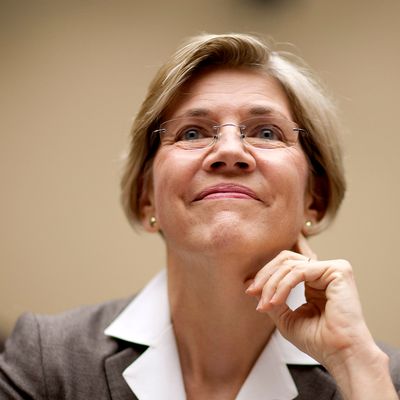
Elizabeth Warren is already giving Wall Street executives serious agita. In their mind, the spunky senator-elect from Massachusetts is heading to Washington for one reason only: to destroy them and everything they stand for.
“Looking at her rhetoric on the campaign trail, she seems to take an exception to wealth creation and what banks do,” said one bank executive. “It’s not really Wall Street she’s against — it’s banks, full stop,” added another.
Banks have disliked Warren since her Harvard days, when she agitated against predatory lending, credit card fees, and other bank practices. And as her national profile grew through her work with TARP oversight and the Consumer Financial Protection Bureau, the watchdog agency she helped create, their arm’s-length opposition became a full-on war. Banks lobbied to keep her from being nominated to head the CFPB, then poured big donations into the campaign of Scott Brown, her Senate race opponent.
After her convincing victory in November, her appointment to the powerful Senate Banking Committee, where she would have actual oversight of the financial sector, is seen by many on Wall Street as a fait accompli.
“It’s all but certain she’ll be on the banking committee. If she isn’t, we’ll be among the most surprised people on earth,” said one bank executive.
Publicly, Wall Street is adopting a conciliatory stance. JPMorgan Chase CEO Jamie Dimon said he called her to congratulate her on her win, and described their relationship as “fine.” But privately, worried bankers are praying that the Senate’s initiation process will take some of the wind out of her sails.
“I suspect she might get a little frustrated,” said one executive at a top-tier bank. “She’s used to doing what she wants and dictating what happens. She’s going to have to earn her stripes.”
“She’s just a junior senator now,” an executive at a different bank said. “One out of a hundred.”
A Warren spokesperson did not immediately respond to a request for comment.
What scares Wall Street most is that, unlike many industry detractors, Warren can stand toe-to-toe with industry lobbyists on the nuances of regulation and the nature of complex financial products. She is also skilled at boiling esoteric points about Wall Street’s excesses down to a pure, potent narrative of intentional malpractice. In her speech at the Democratic National Convention, Warren took on banks using the kind of brusque language you don’t hear all that often on Capitol Hill.
“People feel like the system is rigged against them,” she said. “And here’s the painful part: they’re right. The system is rigged. Look around. Oil companies guzzle down billions in subsidies. Billionaires pay lower tax rates than their secretaries. Wall Street CEOs — the same ones who wrecked our economy and destroyed millions of jobs — still strut around Congress, no shame, demanding favors, and acting like we should thank them.”
The speech was booed by Republicans and mocked by Wall Street, but it was a hit everywhere else, even among legislators not traditionally known for their anti-bank rhetoric.
“I can’t stop thinking about Elizabeth Warren’s speech,” New York Senator Kristen Gillibrand wrote in an e-mail to supporters the next day. “You could hear it in her voice and see it in her eyes: Elizabeth will never give up on the middle class. She’ll be relentless in making sure everyone gets a fair shot.”
That kind of contagion scares some senior Wall Street types, who fear that with a seat on the banking committee and her media-darling status, Warren’s views could spread to other senators in short order.
“She’s not the typical freshman senator,” one Washington-based bank executive said. “She has a following, albeit among the left. And people know who she is.”
If there is a silver lining for Wall Street, it’s that most of Warren’s wrath has historically been focused on commercial banks that issue consumer products like debit cards and mortgages, not investment banks like Goldman Sachs and Morgan Stanley.
“She might bash Wall Street, but only verbally,” one investment bank executive said. “She doesn’t really hit our businesses that much.”
Still, Warren’s most powerful argument, and the one that has caught on among her fellow Senate Democrats, is not really about specific businesses or products. It’s about tone, and the basic failure of Wall Street firms to properly acknowledge their roles in the financial crisis, display sufficient gratitude for having been bailed out by taxpayers, and change their practices accordingly.
In attempt to ingratiate themselves with Warren and avoid the brunt of her newfound power, firms in the senator-elect’s home state are already distancing themselves from their bulge-bracket brethren.
“We don’t consider ourselves Wall Street, honestly,” Tracey Flaherty, an executive at Boston-based asset manager Natixis Global Asset Management, told the Boston Globe last week.
But without that card to play, Wall Street megabanks are left to hope that the Senate will sand down some of Warren’s sharp edges. Several financial firms and lobbying groups said they expected to meet with Warren and her transition staff in the coming weeks to try to curry favor at the start of a six-year term. But few have high hopes for turning her into a friend of the financial sector.
“She has a way of getting what she wants,” another bank executive said with a sigh.





























